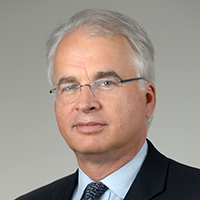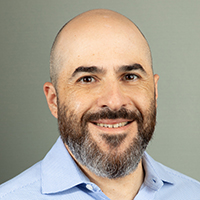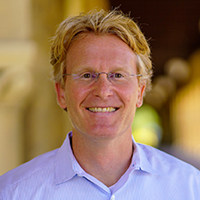NHGRI Division of Intramural Research Seminar Series
Event Details
The 2024-25 Division of Intramural Research (DIR) sponsors a monthly series of talks by intramural and special guest speakers celebrating genetics and genomics research. Speakers are selected by NHGRI intramural faculty and trainees and cover research topics of interest to a wide audience.
All seminars are free and open to the public. Seminar titles and other details are updated as information becomes available.
For more information, please contact Dr. Daphne Bell at belldaph@mail.nih.gov
All times are in EDT.
Microsoft Teams (Requires Registration)
Video Recordings
YouTube Playlist: Videos from 2024-25 DIR Seminar Series
Upcoming Seminars
Disrupting Healthcare Using Deep Data and Remote Monitoring
April 3, 2025, 2:00 - 3:00 PM ET
 Michael Snyder, Ph.D.
Michael Snyder, Ph.D.
Director, Center for Genomics and Personalized Medicine
Department of Genetics
Stanford University
As a pioneer of Precision Medicine, Dr Michael Snyder has invented many technologies enabling the 21st century of healthcare including systems biology, RNA sequencing, and protein chip. Dr Snyder has initiated the Big Data approach to healthcare through his work using omics to detect early-stage disease, including wearables to detect infectious diseases like COVID-19, and at-home microsampling to measure hundreds of molecules from a single drop of blood. He is the first researcher to gather petabytes of data on individuals, which is 1 million - 1 trillion times more data than the average clinician collects. He has published over 900 papers and is one of the most cited scientists. In terms of commercial success, Dr Snyder has co-founded 17 companies (including 2 unicorns) with combined enterprise value of over $6 billion.
Host: Elaine Ostrander
May 8, 2025, 2:00 - 3:00 PM ET
Katie Pollard, Ph.D.
Director, Gladstone Institute of Data Science and Biotechnology
Professor, University of California, San Francisco
Host: Shawn Burgess
June 5, 2025, 2:00 - 3:00 PM ET
Lea Davis, Ph.D.
Professor, Medicine
Professor, Psychiatry
Professor, Genetics and Genomic Sciences
Icahn School of Medicine at Mount Sinai
Host: Joshua Denny and Slavena Goleva
* This event will be rescheduled to the fall as travel and acquisition restrictions are currently in place. Please check back later for updated information.
February 13, 2025, 2:00 - 3:00 PM ET
Justin Cotney, Ph.D.
Associate Professor of Genomic Sciences
Center for Craniofacial Innovation
Children's Hospital of Philadelphia
Host: Neil Hanchard
Follow @justincotney on X* This event will be rescheduled to the fall as travel and acquisition restrictions are currently in place. Please check back later for updated information.
March 27, 2025, 2:00 - 3:00 PM ET
Clement Y. Chow, Ph.D.
Associate Professor
Department of Human Genetics
University of Utah School of Medicine
Host: TBD
Past Seminars
Mapping the feeding circuitry in the human brain
March 20, 2025, 2:00 - 3:00 ET
 Stephen J. Chanock, M.D.
Stephen J. Chanock, M.D.
Director
Division of Cancer Epidemiology and Genetics
National Cancer Institute
Dr. Chanock is a leading expert in the discovery and characterization of cancer susceptibility regions in the human genome. He has received numerous awards for his scientific contributions to our understanding of common inherited genetic variants associated with cancer risk and outcomes.
Dr. Chanock received his M.D. from Harvard Medical School in 1983 and completed clinical training in pediatrics, pediatric infectious diseases, and pediatric hematology/oncology and research training in molecular genetics at Boston Children’s Hospital and the Dana-Farber Cancer Institute, Boston. Since 1995, Dr. Chanock has served as the Medical Director for Camp Fantastic, a week-long recreational camp for pediatric cancer patients, which is a joint venture of the NCI and Special Love, Inc.
From 2001-2007, he was a tenured investigator in the Genomic Variation Section of the Pediatric Oncology Branch in the NCI Center for Cancer Research. He also served as co-chair of NCI's Genetics, Genomics and Proteomics Faculty for five years. In 2001, he was appointed as Chief of the Cancer Genomics Research Laboratory (formerly Core Genotyping Facility), and in 2007 as Chief of the Laboratory of Translational Genomics, both within the NCI Division of Cancer Epidemiology and Genetics (DCEG). Dr. Chanock co-led the Cancer Genetic Markers of Susceptibility project. From 2012 to 2013, he also served as Acting Co-Director of the NCI Center for Cancer Genomics. Dr. Chanock was appointed Director of DCEG in August 2013.
Host: Les Biesecker
Mapping the feeding circuitry in the human brain
January 23, 2025, 2:00 - 3:00 PM ET
 Giles Yeo, Ph.D.
Giles Yeo, Ph.D.
Professor of Molecular Neuroendocrinology
University of Cambridge
Giles Yeo got his Ph.D. in molecular genetics from the University of Cambridge in 1998, after which he joined the lab of Professor Sir Stephen O’Rahilly, working on the genetics of severe human obesity. Giles Yeo is now a Professor of Molecular Neuroendocrinology and programme leader at the MRC Metabolic Diseases Unit in Cambridge and his research currently focuses on the influence of genes on feeding behaviour & body-weight. In addition, he is a fellow of Wolfson College, and Honorary President of the British Dietetic Association. Giles is also a broadcaster and author, presenting science documentaries for the BBC, and hosts a podcast called ‘Dr Giles Yeo Chews The Fat’. His first book ‘Gene Eating’ was published in December 2018, and his second book ‘Why Calories Don’t Count’ came out in June 2021. Giles was appointed an MBE in the Queen’s 2020 birthday honours for services to ‘Research, Communication and Engagement’. He won the Society for Endocrinology Medal in 2022.
Host: Susan Persky
African Evolutionary Genomics: Reconstructing Human Evolution and the Genetic Basis of Complex Adaptive Traits
December 12, 2024, 2:00 - 3:00 PM ET
 Sarah Tishkoff, Ph.D.
Sarah Tishkoff, Ph.D.
David and Lyn Silfen University Professor
Departments of Genetics and Biology
University of Pennsylvania
Director, Center for Global Genomics & Health Equity
Sarah Tishkoff is the David and Lyn Silfen University Professor in Genetics and Biology at the University of Pennsylvania, holding appointments in the Perelman School of Medicine and the School of Arts and Sciences. She is also the Director of the Penn Center for Global Genomics & Health Equity in the Perelman School of Medicine.
Dr. Tishkoff studies genomic and phenotypic variation in ethnically diverse Africans. Her research combines field work, laboratory research, and computational methods to examine African population history, the genetic basis of anthropometric, cardiovascular, metabolic, and immune related traits, and how humans have adapted to diverse environments and diets. She plays an active role as an advocate for the inclusion of ethnically diverse global populations in human genetics and genomics research.
Dr. Tishkoff is a member of the National Academy of Sciences, the National Academy of Medicine and the American Academy of Arts and Sciences. She is a recipient of an NIH Pioneer Award, a David and Lucile Packard Career Award, a Burroughs/Wellcome Fund Career Award, the ASHG Curt Stern Award, the Wilbur Cross medal from Yale and a Penn Integrates Knowledge (PIK) endowed chair. She is President Elect of the American Society of Human Genetics, is on the NAS Board of Global Health and the Scientific Advisory Board for the Packard Fellowships in Science and Engineering and is on the editorial boards at Cell and PLOS Genetics.
Her research is supported by grants from the National Institutes of Health, the Chan Zuckerberg Institute, the American Diabetes Association, and the Pennsylvania Department of Health.
Host: Chris Gunter and Kayla Calvin
Genomics of Host-Microbiome Interactions
November 14, 2024, 2:00 - 3:00 PM ET
 Ran Blekhman, Ph.D.
Ran Blekhman, Ph.D.
Associate Professor
Department of Medicine, University of Chicago
Ran Blekhman, Associate Professor of Medicine at the University of Chicago, specializes in the intersection of human genomics and microbiome research. His research involves leveraging genomic and analytical techniques to unravel host-microbiome interactions in health and disease. The Blekhman Lab studies human genomic factors that control and interact with the microbiome. They utilize high-throughput genomics technologies and employ computational, statistical, machine learning, and population genetic analytical approaches, with the goal of understanding how to interact with the microbial communities, how host-microbe interactions affect human disease, and how the symbiosis between us and our microbiome evolved.
Hosts: Julie Segre and Zeyang Shen
Precision Medicine for the Heart: pioneering technologies for diagnosing, treating and curing dilated cardiomyopathy
October 24, 2024, 2:00 - 3:00 p.m. ET
 Lars Steinmetz, Ph.D.
Lars Steinmetz, Ph.D.
Chair, Department of Genetics, and
Dieter Schwarz Foundation Endowed Professor of Genetics
Stanford University
The Steinmetz lab develops genomic technologies to study the genetic basis of complex phenotypes, the mechanisms of gene regulation, and the molecular systems underpinning disease. We’re leveraging biological insights across scales and organisms to predict, diagnose, treat and ultimately prevent disease.
While technological advances have enabled the association of thousands of genetic variants to complex traits of health and disease, we lack a comprehensive understanding of how genetic variation governs phenotypic diversity and disease. This is largely due to the challenge of discovering the mechanisms through which genetic variation shape cellular phenotypes, as well as the complex interplay between variants and the impact of environmental factors. The Steinmetz Lab's research is directed at developing genomics technologies and approaches to study the molecular processes that underlie complex genetic traits, gene regulation, and inherited diseases. Their approach has been to drive technology development together with biological application, in which they work across the broad axis of fundamental to translational research.
Hosts: Meru Sadhu
The importance of environmental and ancestral context in genetic risk estimation for diverse and admixed populations
September 5, 2024, 2:00 - 3:00 PM ET
 Genevieve Wojcik, Ph.D., MHS
Genevieve Wojcik, Ph.D., MHS
Assistant Professor
Johns Hopkins Bloomberg School of Public Health
Genevieve Wojcik, Ph.D., is an Associate Professor, Department of Epidemiology, Bloomberg School of Public Health, Johns Hopkins University, Baltimore MD. As a statistical geneticist and genetic epidemiologist, Dr. Wojcik’s research focuses on method development for diverse populations, specifically in admixed populations. Many of her efforts focus on improving statistical methods for complex trait mapping and polygenic risk scores for these populations to address existing health inequities and ensure downstream translation for all.
The second arm of Dr. Wojcik’s research program focuses on the genetic susceptibility to infectious disease and vaccine response, with an eye towards host-pathogen co-evolution.
Dr. Wojcik is currently a member of numerous NIH consortia, including the Population Architecture using Genomics and Epidemiology (PAGE) Study, the Genome Sequencing Program (GSP), the Clinical Genome Resource (ClinGen), and the Environmental influences on Child Health Outcomes (ECHO) program, as well as several international collaborations.
Hosts: Daphne Bell, Charles Venditti and Carol Van Ryzin
Last updated: March 28, 2025
